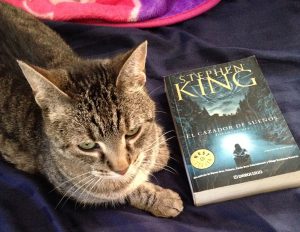The whole dilemma of teaching today can be expressed through one issue, that group-read that occurs in school when we plunk a one-size-fits-all book in front of 27 students.
Reading instruction in schools works best when developmentally appropriate. Appropriate instruction happens only when teachers are free to consider their students, free from rigid curricula based on anticipated test questions. I’ve blogged this observation before: An unreadable book might as well be no book. When we pick our books for test preparation, or pick books set at “grade level” because we intend to drag our students up to that grade level whether they like it or not, we set up reading failures. What is the effect of looking stupid when called on to read? What is the effect of watching students answer questions that you cannot understand, much less answer? “Odelia’s” dislike of books and reading probably stems from that source.
“I don’t like to read,” she said to me today.
I tried to find an area of reading interest. She rejected all my suggestions. This eighth-grade girl has quit reading, except under duress.
I love reading and I strongly support challenging books, but teachers should be selecting the best book for the group – a book that may or may not contain optimal test preparation material. We should be selecting the most interesting book available – if we should be selecting a single book at all.
In these times, when benchmark tests can show members of a single class to be reading anywhere from a second to ninth grade level, the one-size-fits-all book will be incomprehensible to the kids at the bottom and suboptimal for the kids at the top. Benefits from shared reading and discussion will be minimal for outliers, the highest and lowest readers. That may call for breaking up into groups that read different texts.
As we group, group, group — and readers know I am a proponent for whole-group instruction when feasible — ideally, teachers should select readings based on students’ interests, rather than administrative decree. Who knows our students’ personal interests? Who talks with parents about family situations and student social lives? Who watches students becoming frustrated when a book has too many unfamiliar words and phrases? The classroom teacher has boots on the ground. That teacher knows far better than distant politicians or even local administrators which books and materials provide the best fit to different students.
I offer this as one more reason why America desperately needs to return control to the classroom teacher. In academically-struggling districts, “rigorous” books are killing interest in reading. Other educators have coined a term for this: Readicide.*
Eduhonesty: I’d rather have a gifted student read Nancy Drew and enjoy the book than have that student slog through War and Peace. If schools want to create readers, teachers and administrators should focus on what makes reading fun for students. In this time of games and cell phones, we can’t afford to keep boring America’s students with unsuitable book choices.
I’d like to advocate for small groups based on reading ability. Then I’d let the students pick their own books within limits set to keep the teacher sane. For example, I’d pick ten familiar, not-too-easy reads for my low group and let the kids take it from there. If Odelia wants to read Little House on the Prairie and Justin wants to read Freak the Mighty, as long as the books get read, I can handle the extra paperwork involved in grading and creating separate materials.
Because, in the end, if Odelia quits reading now, she’s done. She may or may not make her way through high school. She won’t be ready for high school. She certainly won’t be ready for college. She won’t be ready to be a responsible citizen when it’s time to vote. Odelia has reached eighth grade, but if we can’t convince her to read, eighth grade will be about as far as she gets, even if her body is still occupying a desk for the next few years,
*I recommend checking out Readicide by Kelly Gallagher.

